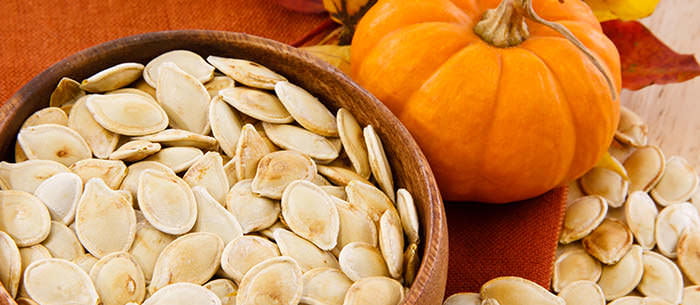What are the benefits of pumpkin seed?
pumpkin seed benefits
It reduces bad cholesterol in the blood, thus protecting the heart; this is possible because its properties are Omega 3 (alpha-linolenic acid) and Omega 6 fatty acids and phytosterols.
They are allies for people who suffer from Diabetes Mellitus because containing proteins regulates the amount of sugar in the blood and increases insulin production in the body. It also reduces oxidative stress.
It prevents diseases such as osteoporosis because it has minerals such as zinc, magnesium and calcium, which protect the bones.
By containing magnesium, it enables the prevention of Cerebrovascular Diseases (CVD), attacks and sudden deaths of the heart.
The zinc has prevented difficulties in academic performance in schoolchildren, acne and unwanted moods such as fatigue and depression.
Zinc also enables newborns to weigh properly according to the bodyweight percentile chart.
They delay ageing and cell degeneration because antioxidants such as vitamin A and vitamin E neutralize free radicals that attack cells.
Its content of cucurbitacin and fibre helps the intestines work properly, fighting parasites and constipation.
They relieve menopausal symptoms such as headache and arterial pain.
They are also anti-inflammatory, a beneficial issue for the inflammations caused by arthritis in the joints.
They serve as a snack and are also beneficial for regulating blood pressure.
The Tryptophan they contain causes the seeds to serve as antidepressants and for the treatment of anxiety.
Pumpkin is a food that contains, among its properties, an enormous load of vitamins and minerals, a low-calorie index, no cholesterol and zero saturated fat. In addition, it is rich in fibre and easy to be incorporated into the daily menu due to the ease of its preparation and the variety of recipes in which its pulp and seeds can be used.
The benefits of pumpkin are many, and its consumption is often recommended by doctors, both for cholesterol control and in weight loss programs and the treatment and prevention of many diseases.
Nutritional properties of pumpkin
According to the United States Department of Agriculture, a cup of cooked pumpkin pulp contains 49 calories, 1.76 grams of protein, 0.17 g of fat, 0 cholesterol, 12 grams of carbohydrates, 3 g of fibre and 5.1 g of sugar.
A serving like this concentrates more than one hundred percent of the daily need for vitamin A for an adult, in addition to 20% of the need for vitamin C and more than 10% of what our body needs vitamin E every day. . She is also rich in B vitamins and a source of minerals such as copper, calcium, phosphorus, and potassium. One cup of pumpkin contains 564 mg of potassium, which is more potassium than a medium banana.
Top 10 Benefits of Pumpkin – What is it used for exactly?
We will now see the properties of pumpkin that can be beneficial for health and good form:
Improves vision and eye health
Pumpkin is one of the vegetables with the highest concentration of beta carotene. Once ingested, beta carotene is transformed into vitamin A, a natural antioxidant that effectively maintains the integrity of the skin and mucous membranes and in the quality of vision. It is worth remembering that the consumption of vitamin A also helps maintain the health of the skin, bones and teeth.
According to the National Institutes of Health, frequent pumpkin consumption can slow down some degenerative eye diseases that lead to blindness.
Pumpkin also has zeaxanthin, an antioxidant capable of filtering ultraviolet rays in the retina of the eyes, offering protection against ageing-related muscle diseases of the eye.
Prevents coronary diseases
Pumpkin is rich in substances that support the health of our heart, such as vitamins A and C, fibre, magnesium, and potassium. It is now known that consuming potassium adequately is almost as important as reducing sodium intake in treating hypertension. Its consumption is also associated with reducing the risk of stroke, protecting against loss of muscle mass, preserving bone density and reducing the formation of kidney stones.
Other benefits of pumpkin for the heart are the relaxation of blood vessels and preventing the accumulation of fat in their walls, avoiding possible obstructions and arteriosclerosis. The presence of the fibres also prevents the increase in cholesterol, leading to various heart diseases.
Read More 10 Benefits of Passion Flower – What It Is for, Side Effects and Indications
Helps to lose weight
According to nutrition expert Dr. Jonny Bowden, pumpkin is an excellent food for those who need to lose weight because it is low in calories and rich in fibre. And this is one of the most sought-after pumpkin benefits indeed. One cup of pumpkin contains 3g of fibre, about 50 calories, and no fat. Because it is nutritious and contains fibres, the vegetable increases the feeling of satiety and improves the digestion process, which leads the person to eat less. According to Dr. Bowden, consuming fibre in the diet decreases the rate of glucose absorption in the body, which keeps the sugar level stable. He explains that if you are dieting, it is important to keep your blood sugar level as stable as possible since increasing this level activates insulin production and the unwanted accumulation of fat in the body.
For pumpkin to be effective in the diet to lose weight, the vegetable must enter as a substitute for some more caloric food than is normally ingested; in this way, you will burn more calories than you consume daily. If you decide to eat a cup of pumpkin puree with cinnamon for dessert, which is equivalent to 80 calories, instead of eating a piece of pumpkin pie, but with 300 calories, you will have eliminated 220 calories from your daily diet.
It’s also worth remembering that getting more fibre in your diet can help reduce your risk of various diseases and health conditions.
With Halloween just around the corner, what do you know about the vegetable of the moment? Whether we like this holiday or not, it is a good time to learn more about the properties of pumpkin on a dietary level as a cosmetic. Laura Parada, a nutritionist at Slow Life House, tells us about them.
It is very rich in vitamin A
They hardly beat the amount of this vitamin. One hundred grams of pumpkin provide the body with 100% of the required daily value of this vitamin, which is essential to have good vision and prevent some tumours.
It is one of the richest vegetables in fibre
And this helps improve intestinal transit.
It is also rich in other vitamins and minerals.
For example, it has a high content of vitamin C (which makes it a great antioxidant), riboflavin, copper, manganese, vitamin B6, thiamine, niacin, magnesium and phosphorus.















